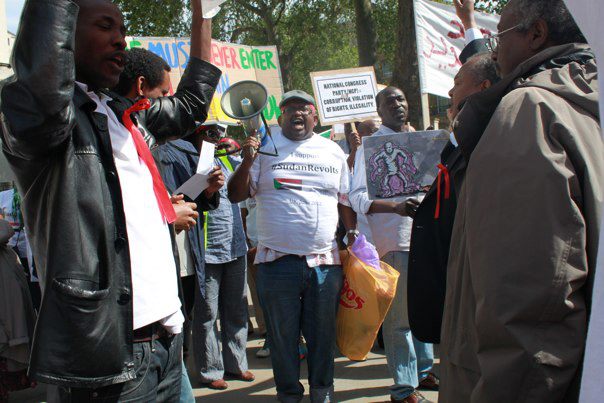Activists and Sudanese Diaspora in London protest over humanitarian situation and in support of Sudan revolts
July 2, 2012 (LONDON) – At least seven charity organisations in United Kingdom on Saturday joined around 600 members of the Sudanese Diaspora to demonstrate in support of protestors in Khartoum and other towns, as well as the humanitarian situation in South Kordofan and Blue Nile, where rebels are fighting the government.

The protestors marched from Lancaster Gate to the office of the British Prime Minister, David Cameron at 10 Downing Street. They delivered a petition bare foot, symbolising how some people have had to flee their homes.
More than 400 people signed the petition, which was delivered by Baroness Caroline Cox, the founder of the UK-based Humanitarian Aid Relief trust (HART).
About 150,000 Sudanese refugees, the United Nations refugee agency (UNHCR) says, have since fled Sudan into South Sudan and Ethiopia. The UN says that this figure could increase sharply as more refugees continue to arrive, forcing the agency to appeal for emergency assistance.
The petition urged the Prime Minister to take assertive diplomatic action towards the Government of Sudan to ensure immediate humanitarian access to the victims of conflict.
“Humanitarian access into the regions, denied since the beginning of the conflict until yesterday by the Government of Sudan, is urgently required to prevent more Sudanese people from dying in the coming months,” the 30 June petition said.
Sudan on 27 June announced its formal acceptance of a tripartite initiative presented by the UN, African Union, and Arab League to deliver humanitarian aid to civilians in the rebel held areas s in South Kordofan and the Blue Nile states.
UN workers and African and Arab monitors are expected to start soon the delivery of food and medical assistance despite the start of rain season .
Many of those displaced, aid agencies say, survive by eating leaves and wild fruits, without clean water or medicine, hiding in caves and forests, while an increasing number of them reportedly do not survive.
The petition also drew attention to the situation in Sudan’s western region of Darfur, where rebels have been fighting government since 2003.
“An escalation in violence in Darfur, blocking of humanitarian aid and denial of visas to humanitarian organizations mean many civilian lives are at risk,” the petition asserts.
The protest walk, which coincided with the 1989 bloodless military coup that brought Sudanese President, Omar al-Bashir, to power, comes as the country is facing street protests against the worsening economic situation.
Sporadic street protests, which were initially started by university students and later joined by other groups, continued in various parts of Sudan’s capital Khartoum and other provincial towns as the government reaffirmed its intention of going ahead with planned austerity measures.
The Sudanese government, as part of the proposed measure, moved to end fuel subsidies, seeking a address the country’s $2.4bn budget deficit which was created mainly as a result of losing 75% of oil revenues when South Sudan seceded, as well as years of failure to diversify the oil-dependent economy.
(ST)
